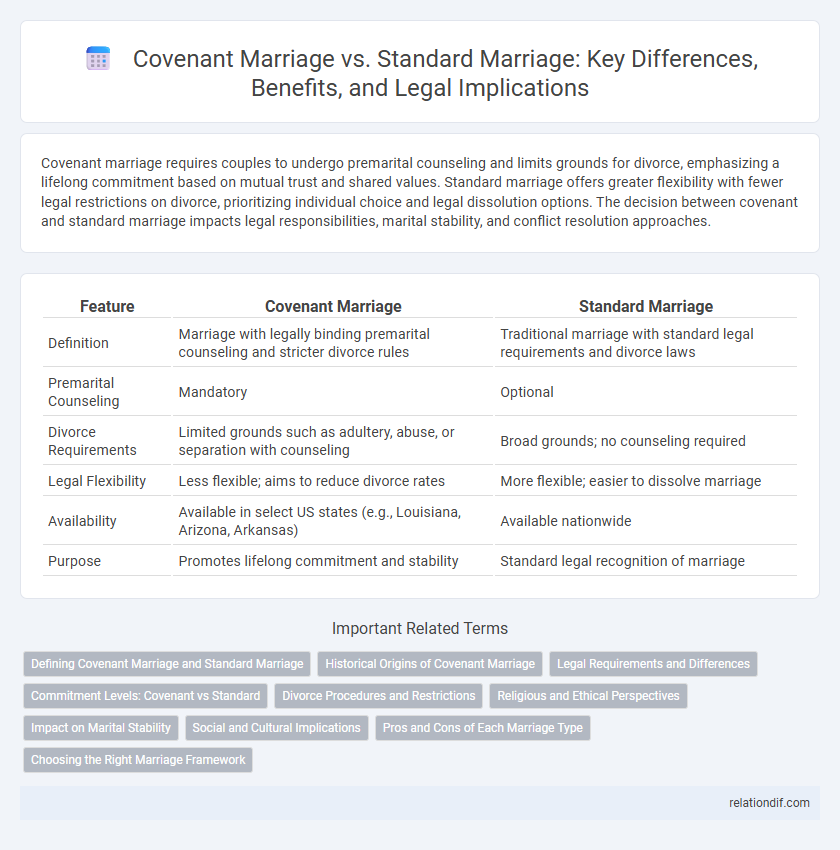Covenant marriage requires couples to undergo premarital counseling and limits grounds for divorce, emphasizing a lifelong commitment based on mutual trust and shared values. Standard marriage offers greater flexibility with fewer legal restrictions on divorce, prioritizing individual choice and legal dissolution options. The decision between covenant and standard marriage impacts legal responsibilities, marital stability, and conflict resolution approaches.
Table of Comparison
| Feature | Covenant Marriage | Standard Marriage |
|---|---|---|
| Definition | Marriage with legally binding premarital counseling and stricter divorce rules | Traditional marriage with standard legal requirements and divorce laws |
| Premarital Counseling | Mandatory | Optional |
| Divorce Requirements | Limited grounds such as adultery, abuse, or separation with counseling | Broad grounds; no counseling required |
| Legal Flexibility | Less flexible; aims to reduce divorce rates | More flexible; easier to dissolve marriage |
| Availability | Available in select US states (e.g., Louisiana, Arizona, Arkansas) | Available nationwide |
| Purpose | Promotes lifelong commitment and stability | Standard legal recognition of marriage |
Defining Covenant Marriage and Standard Marriage
Covenant marriage is a legally distinct form of marriage that requires pre-marital counseling and limits grounds for divorce to specific circumstances such as adultery, abuse, or abandonment. Standard marriage, governed by state laws without added restrictions, typically allows for no-fault divorce, enabling couples to dissolve the union without proving wrongdoing. The covenant marriage model emphasizes a lifelong commitment and increased responsibility by both partners, contrasting with the more flexible standard marriage framework.
Historical Origins of Covenant Marriage
Covenant marriage originated in the early 1990s as a legislative response in states like Louisiana, Arkansas, and Arizona to promote stronger marital commitment and reduce divorce rates. Unlike standard marriage, which primarily relies on a civil contract, covenant marriage incorporates premarital counseling and limits grounds for divorce to encourage lifelong commitment. These historical origins highlight a shift toward reinforcing traditional values through legal frameworks.
Legal Requirements and Differences
Covenant marriage requires couples to undergo premarital counseling, agree to limited grounds for divorce, and commit to a more stringent legal process compared to standard marriage, which typically follows fewer restrictions and allows easier divorce procedures. Legal requirements for covenant marriage vary by state but often include mandatory counseling both before and during marriage and stricter divorce regulations like proving fault or prolonged separation. Standard marriage permits no-fault divorce and has more flexible requirements, making the legal process less restrictive and more accessible.
Commitment Levels: Covenant vs Standard
Covenant marriage requires a higher level of commitment, emphasizing premarital counseling and limiting grounds for divorce to reinforce lifelong dedication. Standard marriage offers more flexibility, allowing couples to dissolve the union with fewer legal restrictions. The commitment in covenant marriage is legally and spiritually binding, often reflecting stronger efforts to sustain the relationship through challenges.
Divorce Procedures and Restrictions
Covenant marriage imposes stricter divorce procedures compared to standard marriage, requiring premarital counseling and limiting grounds for divorce to specific cases such as adultery, abuse, or abandonment. Standard marriage allows no-fault divorce, enabling couples to dissolve the marriage without proving wrongdoing. These restrictions in covenant marriage aim to reduce divorce rates by promoting reconciliation and commitment.
Religious and Ethical Perspectives
Covenant marriage emphasizes a lifelong commitment grounded in religious principles, often requiring premarital counseling and limiting grounds for divorce to uphold ethical values. Standard marriage offers greater legal flexibility, reflecting more secular views that prioritize individual choice over strict adherence to religious doctrines. The ethical debate centers on balancing personal freedom with the moral responsibilities promoted by faith-based unions.
Impact on Marital Stability
Covenant marriage laws, which require premarital counseling and limit divorce grounds, often lead to increased marital stability compared to standard marriage by encouraging couples to work through challenges before considering separation. Studies indicate that couples in covenant marriages experience lower divorce rates and higher commitment levels due to the legal and emotional frameworks supporting the marriage. However, critics argue that the restrictive nature of covenant marriage may also complicate exits from unhealthy relationships, potentially affecting overall well-being.
Social and Cultural Implications
Covenant marriage, emphasizing lifelong commitment and stricter divorce regulations, reflects cultural values prioritizing family stability and traditional social norms. Standard marriage, with more flexible legal grounds for dissolution, aligns with contemporary societal acceptance of individual autonomy and changing family dynamics. These divergent frameworks influence community support systems, social expectations, and the legal landscape surrounding marital fidelity and dissolution.
Pros and Cons of Each Marriage Type
Covenant marriage requires couples to undergo premarital counseling and accept limited grounds for divorce, promoting long-term commitment and reducing impulsive separations but potentially leading to prolonged legal conflicts if marital issues arise. Standard marriage offers greater flexibility and easier divorce procedures, accommodating changing personal circumstances but possibly encouraging higher divorce rates due to less stringent dissolution requirements. Choosing between covenant and standard marriage depends on prioritizing either marital stability with legal constraints or personal autonomy with simpler dissolution options.
Choosing the Right Marriage Framework
Covenant marriage requires couples to undergo pre-marital counseling and limits grounds for divorce, emphasizing commitment and long-term stability, which appeals to those prioritizing a strong legal and moral foundation. Standard marriage offers greater flexibility with fewer restrictions on separation and divorce, suiting individuals who prefer freedom in marital decisions and adaptability to changing circumstances. Choosing the right marriage framework depends on personal values, willingness to abide by legal commitments, and the desired balance between commitment rigidity and marital flexibility.
Covenant Marriage vs Standard Marriage Infographic

 relationdif.com
relationdif.com